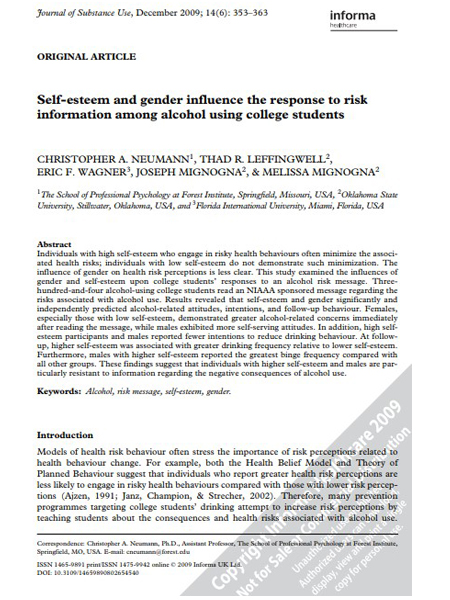Self-esteem and gender influence the response to risk information among alcohol using college students
 Abstract: Individuals with high self-esteem who engage in risky health behaviours often minimize the associated health risks; individuals with low self-esteem do not demonstrate such minimization. The influence of gender on health risk perceptions is less clear. This study examined the influences of gender and self-esteem upon college students’ responses to an alcohol risk message. Three-hundred-and-four alcohol-using college students read an NIAAA sponsored message regarding the risks associated with alcohol use. Results revealed that self-esteem and gender significantly and independently predicted alcohol-related attitudes, intentions, and follow-up behaviour. Females, especially those with low self-esteem, demonstrated greater alcohol-related concerns immediately after reading the message, while males exhibited more self-serving attitudes. In addition, high self-esteem participants and males reported fewer intentions to reduce drinking behaviour. At follow-up, higher self-esteem was associated with greater drinking frequency relative to lower self-esteem. Furthermore, males with higher self-esteem reported the greatest binge frequency compared with all other groups. These findings suggest that individuals with higher self-esteem and males are particularly resistant to information regarding the negative consequences of alcohol use.
Abstract: Individuals with high self-esteem who engage in risky health behaviours often minimize the associated health risks; individuals with low self-esteem do not demonstrate such minimization. The influence of gender on health risk perceptions is less clear. This study examined the influences of gender and self-esteem upon college students’ responses to an alcohol risk message. Three-hundred-and-four alcohol-using college students read an NIAAA sponsored message regarding the risks associated with alcohol use. Results revealed that self-esteem and gender significantly and independently predicted alcohol-related attitudes, intentions, and follow-up behaviour. Females, especially those with low self-esteem, demonstrated greater alcohol-related concerns immediately after reading the message, while males exhibited more self-serving attitudes. In addition, high self-esteem participants and males reported fewer intentions to reduce drinking behaviour. At follow-up, higher self-esteem was associated with greater drinking frequency relative to lower self-esteem. Furthermore, males with higher self-esteem reported the greatest binge frequency compared with all other groups. These findings suggest that individuals with higher self-esteem and males are particularly resistant to information regarding the negative consequences of alcohol use.
Neumann, C.A., Leffingwell, T.R., Wagner, E.F., Mignogna, J., & Mignogna, M. (2009). Self-esteem and gender influence the response to risk information among alcohol using college students. Journal of Substance Use, 14(6), 353-363. doi:10.3109/14659890802654540
